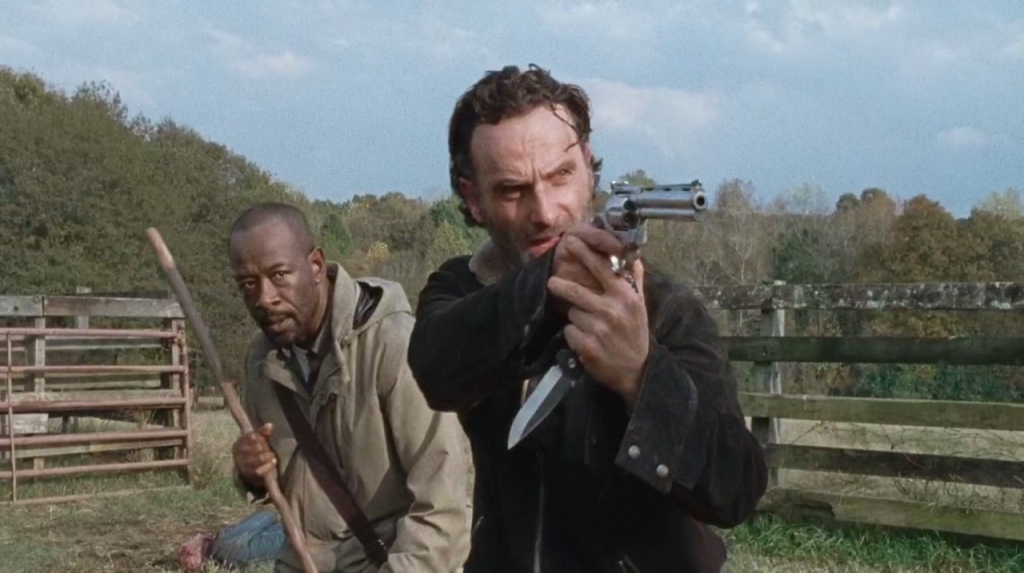-
Recent Posts
- Better Call Saul: There Are No Happy Endings between a “Rock and Hard Place”
- Black Widow Keeps It in the Family for Natasha’s Last Ride
- Loki Finds New Purpose in the Man behind the Mischief
- In its Debut, Star Wars: The Bad Batch Decides Whether to Obey or Rebel
- Nomadland: A Film Out of Time, For Our Times
Archives
Recent Comments
- Ed Clarke on Contact
- Matt on Why “The Frying Game” Is a Dark Horse Contender for The Simpsons’s Worst Episode Ever
- Lilly Dow on Contact
- Stacey on Veep’s Series Finale and the Hollowness of Getting What You Want
- Evan Jaocbs on Contact
Meta
Tag Archives: Episode Reviews
Better Call Saul: What’s Motivating Jimmy McGill in “Fifi”?
Better Call Saul, like its forebear, is full of impressive, creative sequences. Whether it’s last week’s inflatable-man montage, or Kim’s cold-calling routine in “Rebecca”, or the breadstick snaps that convey Jimmy’s unease after his run-in with Tuco, the show isn’t shy about using the various tricks in its visual toolbox to propel the show’s narrative forward. “Fifi” offers two of these sequences, and the two serve distinct, but no less important, purposes.
Posted in Better Call Saul, Television
Tagged Better Call Saul Season 2, Episode Reviews, Kim Wexler, Mike Ehrmantraut, Saul Goodman
2 Comments
The Walking Dead: An Endless Series of Middles in “Last Day on Earth”

One of the interesting things about The Walking Dead under showrunner Scott Gimple’s influence is that it has, more or less, eschewed the traditional narrative structure for a season of television. The storyline of the prison and The Governor seemed to be building to a finale at the end of Season 3, but then it didn’t really end until several episodes into Season 4. Afterward, the show embarked on its Wandering in the Wilderness/Terminus storyline that stretched from roughly the midpoint of Season 4 until the beginning of the Alexandria storyline in Season 5. Then that plotline, about our heroes discovering a new community and gradually integrating into it, reached its natural conclusion with this year’s mid-season premiere, where the Rick’s group and the town came together to defeat the zombies at the gates as a whole. Only then, did the current arc begin in earnest.
Which is to say that as Season 6 draws to a close, we’re not at either the end or the beginning of the Negan storyline; we’re in the middle. That’s admittedly a little strange. It’s a departure from the annual Big Bad structure that Buffy the Vampire Slayer established and many other shows adopted. And it’s even distinct from the trend started by The Wire and The Sopranos, where the real fireworks happen in the penultimate episode of a season, with the finale reserved for aftermath and reflection.
Better Call Saul: The Little Touches that Make a Big Difference in “Inflatable”

What I love about Better Call Saul are the little things, the subtle touches that communicate something powerful about who a character is or what they’re thinking in a clear but artful way. When Jimmy returns to his nail salon beginnings and goes to record his voicemail, he starts off with his faux-British secretary routine. Then he stops and tries it again in his regular speaking voice, not as James M. McGill Esquire, but as Jimmy McGill, attorney at law. It’s a small distinction, but a big difference, and that’s the quiet ethos of the show on display in “Inflatable”.
The Walking Dead: The Circle of Life and Death in “East”

“East” is about cycles, about chain reactions, and the way that decisions big and small come back to us in one form or another. Morgan says it himself — it’s all a circle. But whether that circle is good or bad, whether you get out of it what you put into it, remains to be seen in the world of The Walking Dead.
To Morgan’s mind, that reciprocity or karma or whatever you want to call it, can be a force for good. He decides to spare The Wolf, and to Morgan, that decision not only leads to The Wolf deciding to help to save Denise (which allowed her to save Carl), but it also led to Morgan’s philosophy trickling down to Carol, making Alexandria’s most hardened warrior so uncomfortable with the act of killing that she leaves the community so that she need not risk having to hurt anyone else.
And yet Daryl faces the mirror image of that series of events and sees a very different result. He chooses to spare Dwight, and to Daryl, that makes him responsible both for Denise’s death at Dwight’s hands, and also for the message that it sent to Carol, who had to help him bury yet another innocent person in these harsh environs, and possibly served as the final straw that drove his dear friend away. Both men made the same kind of choice, but interpret the consequences of those choices very differently.
Agents of S.H.I.E.L.D. and the Unsatisfying Farewell in “Parting Shot”

If you want to sell the audience on the kind of “sacrifice” that “Parting Shot” puts forward, you need to do two simple things that Agents of S.H.I.E.L.D. absolutely failed to do.
Posted in Marvel Television Shows, Television
Tagged Agents of S.H.I.E.L.D., Bobbi Morse, Episode Reviews, Lance Hunter, Marvel
Leave a comment
Better Call Saul: The Three Trapped Animals in “Bali Ha’i”

From the moment he received it, the “World’s 2nd Best Lawyer” mug has been a symbol of the way that Jimmy doesn’t really fit with his new surroundings. “Bali Ha’i” doubles down on that symbolism throughout the episode, showing the several ways that the nascent Saul Goodman is a square peg who does not quite belong in the round hole that he now finds himself in.
That’s the major takeaway from the episode’s funny and creative cold open, which features Jimmy fighting insomnia in his generic corporate apartment. He takes the odd wicker balls that seem to be the default decoration in any upper-middle class setting, and turns those bland accent pieces into pure fun and games, whether it be an impromptu bit of hallway soccer or a spate of trick shot basketball. In a moment of resignation, Jimmy turns to late night television to soothe him to sleep, only to find that Davis & Main has adopted his idea to use commercials in order to reach potential Sandpiper clients, but they went with the standard bland production in lieu of his attention-grabbing spot. Eventually, Jimmy is left with no choice but to return to his hovel at the old salon. He clears out enough room for his fold out couch, and is finally at home, at peace, and able to get some sleep.
The broader implications are clear. Try as he might, a man as colorful as Jimmy doesn’t fit into the antiseptic world he’s stumbled into, with the generic living space, the anodyne commercial, and the slick corporate car that doesn’t quite accommodate his oversized novelty coffee mug. So when, at the end of the episode, he pulls out a tire iron and bashes in the cup holder until there’s enough space to hold his beverage container of choice, it’s not just a scene of day-to-day frustration; it’s a quiet act of rebellion that speaks to the ways in which Jimmy is growing ever-weary of the space he inhabits.
The Walking Dead Gets Half as Much after Going “Twice as Far” in a Weaker Episode

How can an episode where so much happens seem so dull? “Twice as Far” features a firefight, a significant casualty, a big decision from a major character, and a reckoning between two people who’ve had unfinished business for a long time now. This is all major stuff. So why did the episode feel so thoroughly lifeless?
In fairness, “Twice as Far” aimed for a certain feeling of routine in the proceedings. It opens with a repeated sequence of supply inventory, guard shifts, and the daily rhythms of Alexandria in order to establish the semi-normalcy that the town has settled into after the most recent bit of excitement. The Walking Dead has thrived on this type of “calm after the storm” vibe in episodes like “The Next World”, but here it felt ponderous and contrived.
Better Call Saul: “Rebecca” – A Dissenting View of Jimmy McGill

Jimmy doesn’t have a bad heart. He never really means to hurt anyone. It’s just how he is. It’s in his nature. He takes advantage of people. Time and again, he leaves the folks that he claims to care about holding the bag. It may come in dribs and drabs, and it may be infused with that old McGill charm, but it’s what he does.
That’s how Chuck sees his brother, and maybe it’s how Kim is starting to see him too.
The Simpsons is Anti-Institutions but Pro-Comedy in “Sideshow Bob Roberts”

The political leanings of The Simpsons are surprisingly hard to pin down. As I discussed with Matt and Robbie on The Simpsons Show Podcast, the natural impulse is to take the series as a left-leaning show. In creator Matt Groening’s Life in Hell comic strip (the primogenitor of The Simpsons) Groening wears his liberal bent on his sleeve. Springfield’s most prominent moment in the “culture wars” of the early 90s culminated in a real life kerfuffle with President George H.W. Bush, which was immortalized in “Two Bad Neighbors”. And the show in general has a propensity to take the stuffing out of anything revered or traditional.
On the other hand, Springfield has a corrupt, sleazy, largely ineffectual mayor who’s a page ripped out of the Kennedy family tome. The show has featured Bill Clinton hitting on Marge and describing himself as “a pretty lousy President.” And The Simpsons is still one of the few shows on television to depict its main characters regularly going to church and emphasizing family values, however fractured the show’s take on those values may be.
The easy answer then, and the one offered by the show’s ambassadors when questioned, is that The Simpsons is an equal opportunity source of satire, plenty willing to get its licks in on both sides of the aisle. While that’s true in a general sense, I believe the show still represents a particular political worldview, at least to the extent that a series which has had so many cooks walk through the doors of its kitchen can be said to have a single perspective.
Posted in Television, The Simpsons
Tagged Episode Reviews, Politics, Sideshow Bob, The Simpsons S06E05, The Simpsons Season 6
Leave a comment
The Walking Dead: “The Same Boat” — Carol Peletier, This Is Your Life!

One of the best parts of Carol’s arc on The Walking Dead is that it’s largely been underplayed. Melissa McBride is such a talented actress that the show can dispense with its often lumpy dialogue and simply let her performance convey the meaning in the moment, whether it’s a sullen look after the events of “JSS” or a harsh tone in her voice when she tells Rick that Maggie shouldn’t be out on the raid in “Not Tomorrow Yet”. This season in particular, The Walking Dead has done well to let the idea that Carol is feeling the weight of her actions and gradually pivoting away from her more ruthless persona, bubble under the surface. That’s made the scenes where those ideas are brought to the fore or dramatized in a more prominent fashion, stand out as effective and earned.
But “The Same Boat” basically turns that subtlety on its ear. It’s a bleak bottle episode that spends most of its time keeping Carol locked in a single room while trotting out an odd version of This Is Your Life!
Posted in Television, The Walking Dead
Tagged Carol Peletier, Episode Reviews, Negan, The Walking Dead S06E13, Zombies
Leave a comment

